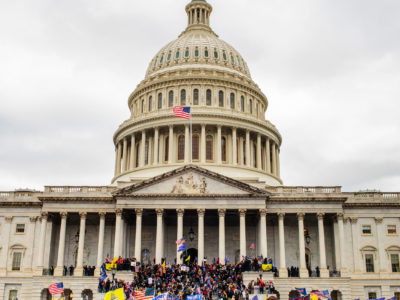The Battle for Congress: Key U.S. House Races in California
Legal Planet: Environmental Law and Policy 2024-09-25

The battle for control of the U.S. House is going to be very tight. Democrats need to pick up only four seats to flip control – something that will be especially important for them if Trump wins and Republicans win the Senate as expected. Especially in that scenario, control of the House will have a big impact on climate and energy policy, one way or the other.
The consensus among political observers is that there are six toss-up races in California. Here are the races and what the candidates say about energy and environment. These are key races for control of the House: If these Republican seats did all flip and Democrats held their remaining seats, Hakeem Jeffries would be the next Speaker.
It doesn’t look like climate or energy are major issues in these campaigns. Only one candidate (Dave Min) devotes significant attention to them. To avoid unintentionally distorting anyone’s views, these descriptions are taken straight from their campaign websites.
I’ve included links to the candidate websites where you can check out their views yourself. Some of the websites pop up a donation or “get involved” page the minute you go there, but you should be able to close that and get to the more informative parts of the website. Sometimes you also have to look around a bit in order to get past the candidate bio and find discussion of the issues.
CA-13 Adam Grey (D) vs. Rep. John Duarte (R)
This district has the highest percentage of Latinos in the state. This race is partly a test of Democrats’ ability to mobilize them and hold their votes.
Grey. Grey’s website stresses his actions in the state legislature to protect Central Valley access to water.
Duarte. Duarte’s lifetime score from the League of Conservation Voters (LCV) is 6%, which equals his score this year. (Depending on your view of the issues you might regard a low LCV score as a good thing or a bad thing). His website emphasizes water issues: “Career politicians have looked out for big donors and special interests on the Coast, while our canals run empty.”
CA-22 Rudy Salas (D) vs. Rep. David Valdao (R)
Salas. Salas’s website says he “secured funding to construct new clean water wells across the Central Valleygeorge and fought for the historic $7.5 billion water bond that invested entirely in water infrastructure.” It doesn’t address other environmental issues, but does attack Valdao for voting against the Bipartisan Infrastructure Law.
Valdao. Valdao has an 89% lifetime LCV score, but this year’s score of 17%. Valdao’s website says that “a safe and stable water supply is critical to the Central Valley” and that “he will fight to address our local needs during the drought.”
CA-27 George Whitesides (D) vs. Rep. Mike Garcia (R)
Whitesides. Whitesides’s website calls for protecting communities from catastrophic wildfires, “addressing the crisis situations at the Aliso Canyon natural gas storage facility and the Chiquita Canyon landfill,” and criticizes Garcia for voting to cut EPA’s budget by 30%.
Garcia. Garcia’s lifetime LCV score is 8%, up to 14% this year. His website attacks the “bloated bureaucracy” and denounces “Democrats’ dangerous socialist agenda.”
CA-41. Will Rollins (D) v. Rep. Ken Calvert (R)
Rollins cites “protecting our planet” as one of the “big issues of our generation.” His website emphasizes “Taking Action on Climate Change, Safeguarding Water Resources and the Environment.” His website has a “clean energy agenda” calling for incentives to expand wind, solar, and energy efficiency.
Calvert. Calvert’s lifetime LCV score is 8% (11% this year). His website seems mostly devoted to touting his work for the district rather than national issues. The website says he “has successfully secured more than a billion dollars in federal funding for transportation, water, and clean air projects for Riverside County.”
CA-47. Dave Min (D) vs. Scott Baugh (R)
Min. Min’s website has a full page on climate change and environmental justice. He touts his endorsement by the Sierra Club and says that “The science is clear: we are facing tectonic changes to our basic way of life unless we begin to aggressively reduce our reliance on fossil fuels and turn the tide on carbon emissions, and the longer we wait, the more terrifying the consequences.”
Baugh. Baugh aims to cut government regulation. According to his website, “We have unelected federal bureaucrats passing more laws than Congress and governing our lives with no accountability. One way to fix this problem is to make Congress approve all regulations adopted by federal agencies before they go into effect.”
CA-45 Derek Tran (D) vs. Rep, Michelle Steel (R)
Tran. Tran was endorsed by California Environmental Voters and Sierra Club, but his campaign website doesn’t discuss energy or environment.
Steel. Steel’s voting record is a bit more anti-environmental than the other Republican incumbents. She has a 4% lifetime LCV score and 0% this year. Like her opponent’s, her website doesn’t mention energy or environment.